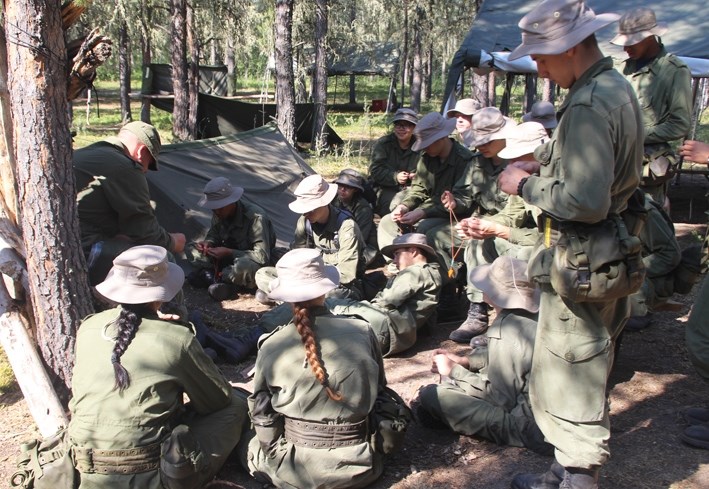Marching drills, air rifle shooting, survival field exercises and aircraft expeditions are just some of the many activities experienced by the over 750 cadets currently living at the Cadet Training Centre out on 4 Wing Cold Lake.
Marching drills, air rifle shooting, survival field exercises and aircraft expeditions are just some of the many activities experienced by the over 750 cadets currently living at the Cadet Training Centre out on 4 Wing Cold Lake.
From June to August the local training centre will host 1,495 air, sea and army cadets aged 12 to 18 from across from British Columbia, Alberta, Saskatchewan, Manitoba, and the Northwest Territories. These cadets attend one of six courses offered on the base, which run in two, three and six week segments.
The cadets who make it to Cold Lake for summer training are hand selected from across the province due to their performance throughout the year with their home squadron.
"There is certainly a selection process," said Captain Craig Moore, Public Affairs representative at the training centre. "Each squadron (throughout western Canada) gets a quota of spots to fill. The cadets chosen have to have good attendance records and their commanding officers recommendation."
Courses offered at the Cold Lake facility include a two-week general training course, a three-week fitness and sport course, a six-week fitness and sport instructor course, a three-week basic aviation course, a three-week basic survival course and a six-week survival instructor course.
Jasper Taylor, who came to Cold Lake all the way from Nelson, B.C., was participating in the survival instructor's course. This course teaches the cadets how to properly survive in the wilderness.
"It is survival training. If their plane went down in the bush they would need to know how to survive until they were found," said Moore.
"They learn how to build shelters, how to build fires, how to build snares, how to find edible plants and how to catch rain water."
Taylor, who is only 14-years-old, is learning the basic survival skills for the purpose of going back and teaching it to his own unit.
"It has been really fun. We've learned (how to tie) knots and lashings, build things like shelters, build fires from improvised materials and do other things like that," said Taylor.
"I've learned that I am really good at making fires. I didn't know that I could do it as well as I can."
The six-week long survival course sees the cadets spend the majority of their week at homemade camps deep in dense bush out on the base. On the weekends they get to head back to a specially made camp complete with dorm rooms, classrooms and a mess hall.
"The people are fun," said Taylor. "It is great to meet people from all over Canada. When we have some free time it gets interesting."
Several of the cadets at the course came all the way down from the Northwest Territories. While many of the cadets at the camp are having new experiences, some of these experiences are not what you would expect.
"We have a couple of kids here from the Northwest Territories and it was the first time they had ever seen trees," said Moore. "Being in the bush was a completely new experience for them."
While cadets in the basic survival training course are just getting used to the idea of living in the bush, the senior cadets are preparing for the toughest challenge of their stay. They will taken into the bush alone and dropped off , where they will have to put their skills to use and survive for a few days. Staff keep a close eye on the cadets while they are out alone in the bush, but do not intervene.
While out in the bush the cadets are prepared with the necessary gear to ward off bears.
"We give them all bear equipment," said Moore. "They have whistles and radios. We are definitely set up with good communication in case anything happens."
The cadets at the camp are well supervised with 110 adult supervisors there operating the training exercises.
Some of the those who make up the adult supervisors at the training centre include military reservists. These military members, from across Canada, take the summer off from their normal duties and come out to Cold Lake for two months to teach the course.
Cadet training in Cold Lake first began back in 1973 with the introduction of the Senior Leaders Course. This course was the only one offered at the local base until the Survival School relocated to 4 Wing in 1988.
By the time 1993 rolled around the local base had expanded to three Survival Schools and rebranded to the Cold Lake Air Cadets Summer Training Centre.
In 2010 the Basic Fitness and Sports Course came to Cold Lake for the first time, with the Fitness and Sports Instructors Course coming along the following summer.
This year the centre has once again rebranded its name, dropping the air cadet from the title as the course now sees air, sea and army cadets call the training centre home during the summer months.
"We are trying to recognize that tri-service element of army, sea and air," said Moore. "We are getting a good cross section and we get to know each other and learn what each group does."
